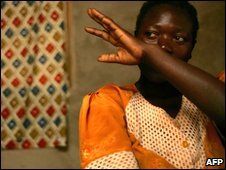It's been that way since the Belgians first set foot there about 150 years ago.
"From c. 1390 to 1891 it was mostly an independent state. From 1891 to 1914 it was a vassal state of the Kingdom of Portugal. In 1914, the titular monarchy was forcibly abolished, following Portuguese victory against a Kongo revolt. The remaining territories of the kingdom were assimilated into the colony of Angola. The modern-day Bundu dia Kongo sect favors reviving the kingdom through secession from Angola, the Republic of the Congo, the Democratic Republic of the Congo, and Gabon." - Wiki
"From that region of Africa as well as East Africa, diffusions of Blacks towards the Americas as early as 30,000 B.C. are believed to have occurred based on findings in a region from Mexico to Brazil which show that American Indians in the region include Negritic types (eg. Olmecs, Afro-Darienite, Black Californians, Chuarras, Garifunas and others). Much earlier journeys occurred by land sometime before 75,000 B.C. according to the Gladwin Thesis written by C.S. Gladwin. This migration occurred on the Pacific side of the Americas and was began by Africans with Affinities similar to the people of New Guinea, Tasmania, Solomon Islands and Australia. The earliest migrations of African Blacks through Asia then to the Americas seemed to have occurred exactly during the period that the Australian Aborigines and the proto-African ancestors of the Aborigines, Oceanic Negroids (Fijians, Solomon Islanders, Papua-New Guineans,and so on) and other Blacks spread throughout East Asia and the Pacific Islands about one hundred thousand years ago. The fact that these same Blacks are still among the world's seafaring cultures and still regard the sea as sacred and as a place of sustenance is evidence of their ancient dependence on the sea for travel and exploration as well as for commerce and trade. Therefore, they would have had to build sea-worthy ships and boats to take them across the vast expanses of ocean, including the Atlantic, Indian Ocean (both the Atlantic and Indian Oceans were called the Ethiopean Sea, in the Middle Ages) and the Pacific Ocean." - Paul Barton

